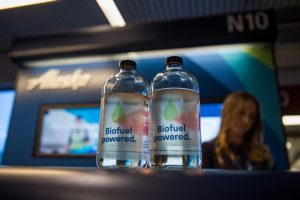An Alaska Airlines flight from Seattle Sea-Tac International Airport to Washington, DC took off yesterday powered by a 20 percent cellulosic alcohol biofuel blend produced by Gevo. The aviation biofuel is branded as Alcohol-to-Jet (ATJ) fuel and is produced from woody residues in the Pacific Northwest including limbs, stumps and branches. The ATJ fuel for this flight was made from forest waste from sustainably managed forests owned by Weyerhaeuser (OR), the Muckleshoot Indian Tribe (WA), and the Confederated Salish Kootenai Tribes (MT). In addition, some of the rejected residues were provided from Cosmo Specialty Fibers (WA).

Photo Credit: Alaska Airlines
“This latest milestone in Alaska’s efforts to promote sustainable biofuels is especially exciting since it is uniquely sourced from the forest residuals in the Pacific Northwest,” said Joe Sprague, Alaska Airlines’ senior vice president of communications and external relations. “NARA’s accomplishments and the investment of the U.S. Department of Agriculture provide another key in helping Alaska Airlines and the aviation industry reduce its carbon footprint and dependency on fossil fuels.”
The flight used 1,080 gallons of biofuel and while it had a minimal impact on the airline’s overall GHG emission reductions, Alaska Airlines says if it were able to replace 20 percent of its entire fuel supply at just Sea-Tac Airport, it would reduce GHG emissions by 142,000 metric tons of CO2 or the equivalent of removing 30,000 cars off the road over the course of one year. In June, Alaska Airlines also flew the friendly skies with a Gevo aviation biofuel.
Also celebrating the accomplishment were several organizations that had a hand in the production of the biofuel. While Gevo gets credit for producing the aviation biofuel, ICM’s integrated biorefinery pilot plant in St. Joseph, Missouri milled, enzymatically hydrolyzed to sugars and then fermented to isobutanol using pretreated hemlock and lodgepole pine. An element of the process was Gevo’s fermentation microorganism and GIFT process located at the plant. Once the isobutanol was recovered by distillation, it was then transported to Silsbee, Texas.
ICM’s Vice-President, Technology Development, Steve Hartig said, “ICM’s pilot plant provides customers like GEVO with access to high quality pilot plant equipment and people, in order to enable efficient process development and production campaigns. This project has been a tremendous success and required a mix of mechanical, chemical and biological skills which ICM’s team was able to bring.”

Photo credit: Alaska Airlines
Passengers had a surprise in Washington, DC where they were greeted by Agriculture Secretary Tom Vilsack. He highlighted the bioenergy breakthrough along with the benefits the bioenergy industry provides including supporting jobs and rural economies. The five-year project (from conception to flight) was supported in part by a $39.6 million research and education project from USDA’s National Institute of Food and Agriculture (NIFA). The project was led by Washington State University and the Northwest Advanced Renewables Alliance (NARA) that was launched in 2011.
“In 2011, USDA awarded our largest-ever competitive research grant to the Northwest Advanced Renewables Alliance, betting on the promise that cellulose-rich, discarded wood products could be a viable renewable fuel source instead of going to waste. Today, we are able to celebrate the results of that investment, which is a major advancement for clean alternatives to conventional fossil fuels,” said Vilsack. “Over the course of the Obama Administration, USDA has invested $332 million to accelerate cutting-edge research and development on renewable energy, making it possible for planes, ships and automobiles to run on fuel made from municipal waste, beef fat, agricultural byproducts and other low-value sources. All of this creates extra income sources for farmers and ranchers, is bringing manufacturing jobs back to rural America, and is keeping our country at the forefront of clean energy and innovation. We must continue to focus on targeted investments to help the rural economy retool itself for the 21st century.”
 Prior to COP22, the United Nations released an Environment Programme (UNEP) report that determined current global emission reduction commitments will fall far short of international temperature targets. The report called for global emissions reductions of at least a quarter by 2030.
Prior to COP22, the United Nations released an Environment Programme (UNEP) report that determined current global emission reduction commitments will fall far short of international temperature targets. The report called for global emissions reductions of at least a quarter by 2030.











